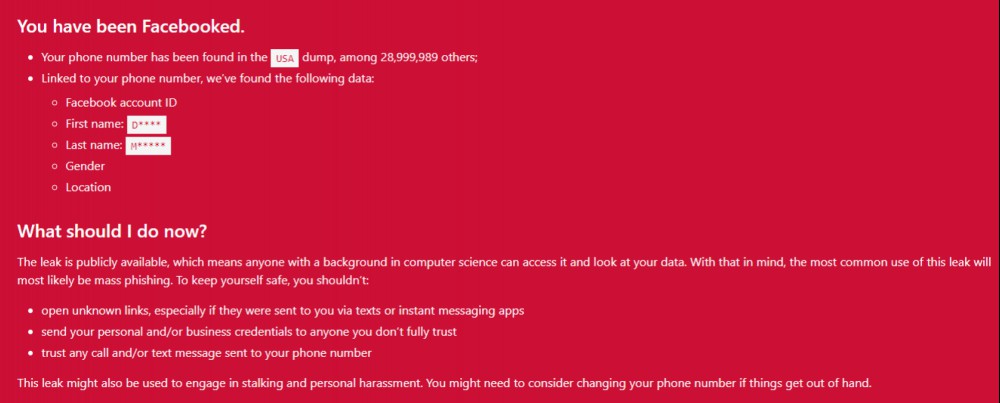How to Stream Google Stadia on iOS/iPadOS
In a perfect world, we could download apps from a centralized, secure app store on our phones, and these apps would allow us to connect to other servi

An old data breach is still a data breach, and you’re probably still going to need to pay attention to it when it has to do with Facebook, a site most people have used at some point. As you’ve probably already heard, a past data breach affecting half a billion Facebook users is making the rounds yet again after a hacker posted a wealth of personal information lifted from the hacked accounts. And even though the actual hack took place two years ago, you can still take a few preventative measures to make sure this latest incident doesn’t affect you much.
For starters, take the time to check and see whether your data—including your email address, phone number, name, and other identifying characteristics—even appears in said breach. Try one of these options to search for different identifying information that may have been compromised:
have i been pwned (email)
Have I Been Facebooked? (phone number)
The News Each Day (phone number)
Facebook Checker (phone number)
The raw data dump (everything)

If your phone number or other details aren’t in the breach, great! You’re good. If they are, there’s not much you can do about it, now that the information is out and about. On the plus side, you don’t have to worry about your password having been stolen, but this data could be used in phishing attempts elsewhere, and possibly even to reset your passwords or brute-force entry into your accounts, depending how bad a service’s password recovery/reset mechanism is.
That all said, since this data has been floating around for some time, odds are good that you probably aren’t affected if you haven’t already been affected. If anything else, the entire episode shows the importance of using dummy information wherever possible when signing up for an account—especially on social media. Obfuscation is entirely within your control. Don’t feel as if you have to give up legitimate details about your life.

For Facebook, that could include:
Not supplying any optional information if you don’t have to (your educational history, everywhere you’ve lived, your interests, your work history, etc.)
Providing dummy information when asked, like a fake birthdate or a pseudonym. (Keep track of these in the notes section of your favorite password manager in case you’re ever challenged over your fake info in order to regain access to your account or reset your password.)
Using a fake email address (even a slightly modified one, like [email protected] instead of [email protected]) and a phone number that isn’t your actual phone number to sign up for an account. As before, save these credentials in your password manager just in case.
Use a different “real” name or a slightly modified version of your name. Don’t use the same “screen name” or account name across all of your different services (something we’re all guilty of, no doubt).
Why does this matter? It makes it a lot harder for attackers to use information gleaned from one data breach to affect you elsewhere. If you’re always using different information whenever possible across the various services you use, it’ll be harder to for an attacker to social engineer their way into your account—they simply won’t know enough about you on each service.
Going forward, make sure you’re staying on top of any potential phishing attempts. If you get a text or email out of the blue that attempts to convince you of its legitimacy by giving you some (now readily available) information about yourself, don’t initiate an action on a service based solely on that message. Don’t provide anyone else with any other information in response. Don’t click or tap on links if you aren’t sure where they came from. Instead, pull up your browser, go visit the service directly, and check to see if there’s really something you need to take care of.

In a perfect world, we could download apps from a centralized, secure app store on our phones, and these apps would allow us to connect to other servi

I’m a bit forgetful, which is why I always use a password manager to remember all of my quirky and complex passwords for everything. Even then, I occa

Every year my family follows a strict holiday watch list, including a rule that The Muppet Christmas Carol must only be viewed on Christmas day—no ear

If, like me, you follow dozens of YouTube channels across a range of topics, you might find you occasionally miss an upload (or a few) as you’re bomba

The first Android 12 beta is out now for a range of Android devices, and early impressions are positive. Testers praise the overhauled interface and p

Meeting people on dating apps can be fun, but the last thing most people want to see while swiping is a face from their past. Luckily, avoiding your e

Just like the hidden symbols on an iPhone’s keyboard, there are plenty of useful keys buried under one long-press on your Android. Before we share the

We love to joke that no one uses their smartphone to actually make calls in 2021. And even if that’s kind of true, we obviously need these devices to
We are a comprehensive and trusted information platform dedicated to delivering high-quality content across a wide range of topics, including society, technology, business, health, culture, and entertainment.
From breaking news to in-depth reports, we adhere to the principles of accuracy and diverse perspectives, helping readers find clarity and reliability in today’s fast-paced information landscape.
Our goal is to be a dependable source of knowledge for every reader—making information not only accessible but truly trustworthy. Looking ahead, we will continue to enhance our content and services, connecting the world and delivering value.